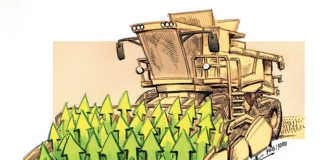Women play a clear, acknowledged role in developing economies. According to US politician Hillary Clinton, women are the largest untapped reservoir of talent in the world. Their entrepreneurship is critical to the success of achieving the United Nations’ Sustainable Development Goals. These are intended, inter alia, to end poverty, achieve food security, improve nutrition, and promote sustainable agriculture, gender equality and economic growth.
In every region of the world, more and more women are seeking economic opportunity and self-determination through enterprise creation. It is expected that by 2018, 9,72 million small business-related jobs will be created and female entrepreneurs will contribute more than 50% in this. Statistics of this nature prove that women are becoming more comfortable in assuming leadership positions and creating job opportunities on a large scale.
Women in rural Africa feed 80% of people on the continent. Despite the challenges they face, these farmers continue
to produce food for survival. But they need to go beyond merely surviving. We want to transform their small roadside activities to medium- and large-scale agribusinesses.
According to Martin Wyn Griffith, the CEO of UK-based Small Business Services, a dollar invested in developing women’s enterprises provides a greater return on investment than a dollar invested in developing male-owned enterprises. Women starting up in business tend to provide a more immediate contribution to the economy. Around one in five women come into self-employment from unemployment compared with around one in 15 for men.
The highest regional female total early-stage entrepreneurial activity (a commonly used indicator) can be seen in sub-Saharan Africa, where 27% of the female population on average is engaged in entrepreneurship. Latin America/Caribbean economies show comparatively high levels as well, at 15%.
Barriers
However, women entrepreneurs face many challenges and perform poorly in Africa. One of the underlying reasons is that they do
not have the same access to, or control of, resources as their male counterparts. The term ‘resources’ refers to physical inputs such as land, capital, livestock, fertilisers and mechanical equipment; human resources such as farm labour; social resources such as education; and institutional resources such as extension services.
Lack of finance is a problem faced by women in less-developed entrepreneurial ecosystems such as in Africa as well as in countries such as the US, which have sophisticated financial systems for entrepreneurship. Financial constraints account for twice the proportion of business discontinuance among women than among men. Women are around 10% more likely than men to see finance as their only barrier to entrepreneurship and they start businesses with around one-third of the level of finance of their male counterparts, in every size and sector of business. Fear of debt is the single largest barrier to women entrepreneurship.
The need to care for the family
One prevalent influence on women’s entrepreneurship is the role they hold in their families. They are often the primary caregivers for children, and sometimes parents. As a result, they need to juggle both family and entrepreneurship, which tends to restrict their ability to grow their businesses.
An issue close to my heart is that of promoting education, vocational training and professional development for women. We need women-friendly skills development and training courses that allow small modules of training to be completed at a time, empowering women to gain skills and grow their businesses while still carrying out domestic tasks and caring for their families.
The culture of business remains predominantly male-dominated and influences the way women think of themselves as entrepreneurs. One of the advantages which male entrepreneurs enjoy includes the long- established, predominantly male networks in business organisations, golf clubs and so on.
Moving forward
The evolution of female networks has powerful significance for women in providing mutual support, encouragement and business contacts. Women can also benefit from mentoring to develop their self-confidence and find sources of finance and assistance.
It is also important for women to participate in political processes. They control 50% of the vote in Africa; this is significant power. Women need to find their voice and use it to effect change because the transformation of the continent will not happen without fully empowering women.
We need strong women’s organisations to act as a unified force, to approach government and articulate a business case for women’s empowerment. Working together, they can compel policymakers to implement enterprise development, supply chain and marketing practices that empower women. It is also easier to access training when it can be delivered to a group.
With the expanding role of women entrepreneurs, there is a need to develop tools to help them improve. These include specialised financial services, micro-finance opportunities and business loans, as well as an online resource centre for those running small- and medium-sized enterprises.
We lose 40% of all the food grown in Africa because we lack the appropriate infrastructure and storage facilities. Africa imports $40 billion (R558 billion) of food every year, so we know there is a market for food. But in the meantime, we waste food that women have put much effort into growing. Actions are needed to change this. It is unacceptable in a time of poverty and hunger.
I see much potential but women need to use their voice to make that change. And politicians won’t be putting policies in place as a favour to women, but because it is the economically correct and financially favourable thing to do. – Robyn Joubert













